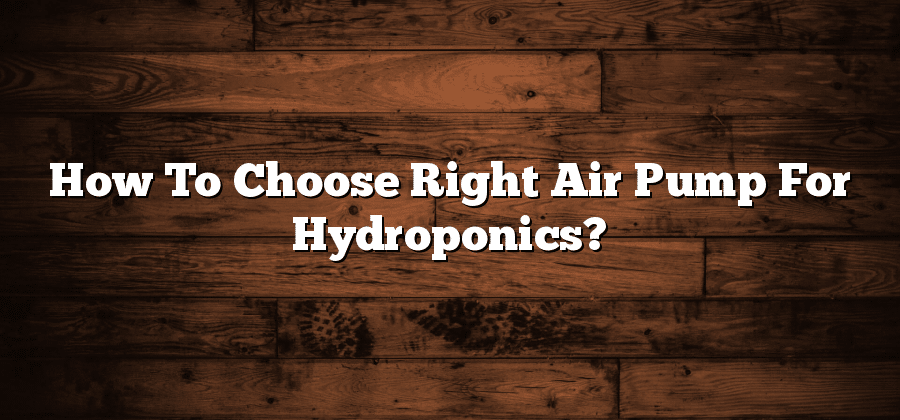Understanding the Importance of Air Pumps in Hydroponics
Air pumps play a crucial role in maintaining the overall wellbeing of a hydroponic system. Hydroponics, the method of growing plants without soil, relies heavily on the delivery of nutrients through the water solution. However, simply providing water and nutrients is not enough for healthy plant growth. Plants also require oxygen to survive and thrive, and this is where air pumps come in.
Air pumps in hydroponics act as a source of oxygen for the plants by constantly circulating air throughout the water solution. This process, known as oxygenation, ensures that the roots get the adequate supply of oxygen they need. In addition, air pumps help prevent the water from becoming stagnant, which can lead to root rot and other detrimental conditions for plant growth.
By understanding the importance of air pumps in hydroponics, growers can take the necessary steps to ensure the success of their system. The presence of oxygen not only promotes healthier root development but also increases nutrient absorption and overall plant growth. Without proper oxygenation, plants in a hydroponic system may suffer from stunted growth, nutrient deficiencies, and even death. Therefore, investing in a high-quality air pump is essential for achieving optimal results in hydroponic cultivation.
Evaluating Your Hydroponic System’s Oxygenation Needs
When evaluating your hydroponic system’s oxygenation needs, it is crucial to consider the specific requirements of your plants. Different plants have varying levels of oxygen requirements, and it is essential to provide them with an appropriate amount to maintain optimal growth.
To assess your hydroponic system’s oxygenation needs, start by observing your plants closely. Look for signs of oxygen deficiency, such as wilting leaves, stunted growth, or yellowing of the foliage. These indicators might suggest that your plants are not receiving sufficient oxygen and that adjustments need to be made to improve oxygen levels in the system.
Additionally, consider the size and type of plants you are growing in your hydroponic system. Generally, larger plants require more oxygen than smaller ones due to increased metabolic activity and higher oxygen demand. Therefore, it is necessary to ensure that your air pump can provide enough oxygen to meet the needs of your specific plant species.
Determining the Ideal Air Pump Size for Your Hydroponic Setup
One of the key factors to consider when setting up a hydroponic system is the air pump size. The air pump plays a crucial role in delivering oxygen to the plant roots, ensuring their healthy growth and development. Determining the ideal air pump size for your hydroponic setup is important to maintain optimal oxygen levels and promote strong, vibrant plants.
When selecting the air pump size, it is essential to consider the size of your hydroponic system and the number of plants it supports. The size of the air pump is typically measured in liters per minute (LPM) or gallons per hour (GPH), indicating the volume of air it can deliver. A general guideline is to choose an air pump that can provide a minimum of 2-3 LPM or 60-90 GPH for every gallon of nutrient solution in your system. This ensures an adequate supply of oxygen to the root zone, promoting healthy root growth and efficient nutrient uptake. However, it is important not to oversize the air pump as excessive aeration can lead to the loss of water and nutrients from the system. Finding the right balance is crucial for optimal plant health.
Assessing the Noise Level of Potential Air Pump Options
When considering potential air pump options for your hydroponic system, it is crucial to assess the noise level of each option. Noise can be a significant factor, especially if your hydroponic setup is located in an area where silence is preferred or if you are growing plants in a residential setting. Excessive noise can not only disrupt your peace but also cause stress to your plants, potentially affecting their growth and overall productivity.
To accurately assess the noise level of potential air pump options, it is advisable to check the product specifications provided by manufacturers. Look for information on decibel levels or any noise-reducing features. Additionally, reading customer reviews can give you valuable insights into the actual noise levels experienced by users. By carefully evaluating the noise aspect, you can ensure that your hydroponic system operates smoothly and harmoniously, benefiting both you and your plants.
Considering the Energy Efficiency of Different Air Pump Models
When it comes to selecting the right air pump for your hydroponic setup, energy efficiency is a crucial factor to consider. Not only does an energy-efficient air pump help reduce your overall electricity consumption, but it also allows for cost savings in the long run. By choosing a model with high energy efficiency, you can minimize the impact on the environment while maximizing the performance of your hydroponic system.
To assess the energy efficiency of different air pump models, you should look for specific features that promote energy conservation. One key aspect to consider is the pump’s wattage. Opting for a low-wattage air pump ensures that it consumes less power without compromising its performance. Another feature to look for is the pump’s motor efficiency. Motors with high efficiency can deliver the required amount of air while minimizing energy waste. Additionally, consider whether the air pump has any adjustable settings or timers that allow you to control its operation, ensuring it only runs when necessary. By carefully evaluating these features, you can make an informed decision and choose an energy-efficient air pump that aligns with your hydroponic system’s requirements.






